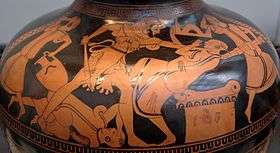Busiris (Greek mythology)

Busiris (Greek: Βούσιρις) is the Greek name of a place in Egypt, which in Egyptian was named ḏdw (pronounced Djedu). The location was an important necropolis and a centre for the cult of Osiris, hence name Busiris. The word Busiris was also used to refer to chief god of Busiris, an attribute of Osiris.
In Greek mythology, Isocrates, in his witty declamation Busiris recounts "the false tale of Heracles and Busiris" (11.30–11.40), which was a comic subject represented almost entirely in the repertory of early 5th century BC Athenian vase-painters:[1] the theme has a narrow narrative range, according to Niall Livingstone: Heracles being led to sacrifice; his escape; the killing of Busiris; the rout of his entourage.[2]
The brief synopses concerning Busiris in pseudo-Apollodorus' Bibliotheke are at II.1.5 and II.5.11: Busiris there is one of the fifty sons of Aegyptus, betrothed to a Danaid.[3] In Isocrates' rhetorical use of a theme that he considers unworthy of serious treatment,[4] the villainous king of Egypt named Busiris, a son of Poseidon and Anippe,[5] daughter of the river-god Nilus,[6] was the ancient founder of Egyptian civilization, with an imagined "model constitution" that Isocrates sets up as a parodic contrast to the Republic by Plato. The monstrous Busiris sacrificed all visitors to his gods. Heracles defied him, broke his shackles at the last minute and killed Busiris.
In Diodorus Siculus, Busiris appears as the founder of the line of kings at Thebes, which historically would have been the 11th Dynasty.
This part of the mythology concerning Herakles appears to have origins in a corruption of an Egyptian myth concerning Osiris' sacrifice by Set, and subsequent resurrection (see Legend of Osiris and Isis).
The fictional king Busiris also appears, as the leader of a revolt, in the ironically-titled True History (2.23) by Lucian, written in the 2nd century CE.
In Paradise Lost, John Milton uses "Busiris" as the name of the Pharaoh of the Exodus, which suggests a comparison between Heracles' escape and the Israelites' escape from slavery.
Notes
- ↑ And in Magna Graecia, according to Livingstone, who notes that there are no vase-paintings of this subject in mainland Greece aside from Athens; for another comic episode, compare the mytheme of Heracles and the Cercopes.
- ↑ Livingstone 2001:87.
- ↑ "Clearly this latter Busiris, for whom a different fate lies in store, is not to be identified with Heracles' adversary," Neall Livingstone remarks (2001:86); he notes, however, that Aegyptus is the son of Belus, who is given the same genealogy as that which Isocrates gives Busiris: a son of Poseidon and Libya, a personification of Libya.
- ↑ Niall Livingstone surveys the sketchy previous literary references.
- ↑ Anippe plays no other role in Greek mythology.
- ↑ According to a fragment of Pherecydes; In Isocates, Busiris 10, a genealogy that adds Libye for mother may be invented, Neall Livingstone suggests (2001:86), as part of Isocrates' mock encomium.
Further reading
- Livingstone, Niall "A Commentary on Isocrates' Busiris" (Brill) 2001. The first scholarly commentary devoted to Busiris.
External links
| Wikisource has the text of the 1911 Encyclopædia Britannica article Busiris. |
-
 Media related to Busiris at Wikimedia Commons
Media related to Busiris at Wikimedia Commons